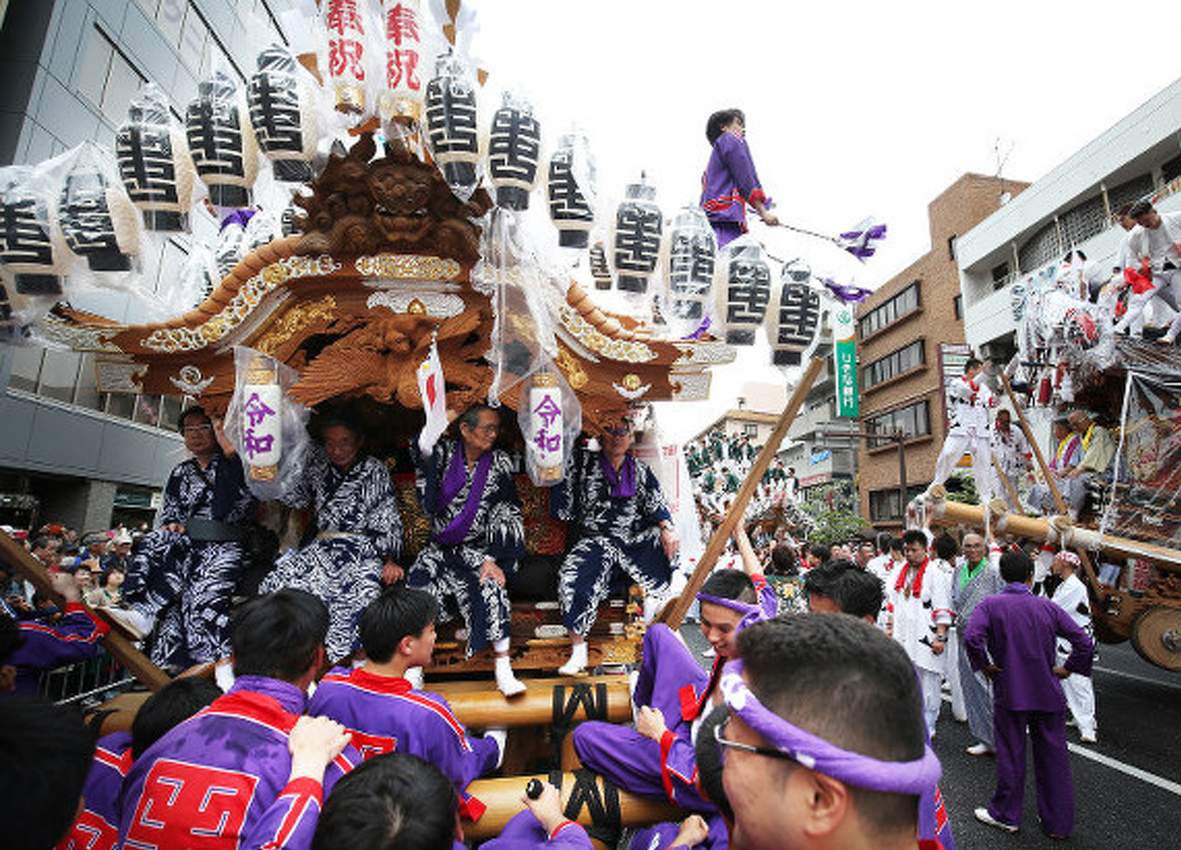 Danjiri floats are gathered for a parade to celebrate the beginning of the Reiwa era, in Kobe's Higashinada Ward on May 1, 2019. (Mainichi/Yohei Koide)
Danjiri floats are gathered for a parade to celebrate the beginning of the Reiwa era, in Kobe's Higashinada Ward on May 1, 2019. (Mainichi/Yohei Koide)
Yoroku: Start of Reiwa era a time to tackle old problems with fresh energy
When I first came upon the Japanese term, "hatsu mukashi," in a glossary of traditional seasonal phrases, it left quite an impression on me. It is one of the season words in haiku poems that indicate the New Year, but this particular term refers to looking back on the year gone by.
In other words, the term turns even a casual event from the day before into a thing of the "past."
So the Imperial era of Heisei, which spanned some three decades, instantly became an era gone by at the stroke of 12 a.m. on May 1, the dawn of the Reiwa era. Today, May 1, is sort of like the New Year's Day of Reiwa.
Unlike astronomical calendars, the change of the era name is based on man-made arrangements. Yet it makes us feel as if we've been given time to start anew, which may be something we can appreciate at the turn of the era.
There is a haiku composed by Garai Sawai that includes the words "hatsu nikki," a seasonal theme referring to the first diary entry of the year, and "hakucho," or a white swan. It is enviable that someone can find a white swan representing happiness in a brand new diary awaiting the first entry.
The annals of the Reiwa era are still blank, and who knows what events we are going to chronicle in the years to come?
The Heisei era was fraught with natural disasters, including two major earthquakes -- the 1995 Great Hanshin Earthquake in western Japan and the 2011 Great East Japan Earthquake and tsunami in the northeast. The issues of the declining birth rate and aging society, a test of historical proportions to our civilization, are being handed over to the new era.
Outside of Japan, the struggle for hegemony between the United States and China and the "our country first" policies prevailing in many national capitals have highlighted the fraying of the world order.
In Reiwa-era Japan, whose population is destined to fall, our biggest task in civilizational terms is to create a multicultural society where people live in harmony with foreigners.
In a world that is becoming increasingly unstable, Japan is urged to not lose sight of the basic principles of international cooperation and give its fair share of consideration to protecting peace. These tasks are not easy.
All told, issues left behind by the Heisei era have been carried over to Reiwa. Yet we have a blank page ahead of us, and may even spot a white swan in our coming annals. Let us raise our chin up, set our sights afar, and stride forward. Those will be the first entries of my new diary.
Source: https://mainichi.jp/english/articles/20190501/p2a/00m/0na/019000c
 English
English Japan
Japan

costco pet meds natural cures for erectile dysfunction how does viagra work how effective is cialis for daily use amazon india today's deal does sildenafil 20 mg work
sex simulator games free sex games i purchased manal sex games
who makes viagra pfizer long term flomax side effects best online pharmacy for viagra all natural male enhancements what viagra can do red pill for impotence buy viagra cheap what time does walmart pharmacy close sildenafil 100 mg tablet cost herbal viagra sildenafil cream for women price for viagra viagra 100mg pills for men herbicide groups chart ed over the counter cvs whats viagra migraine headache location sanofi allegra samples best price on generic viagra professional samples of baby products women take viagra cialis double dose cialis versus viagra which is better cvs extracare 25% off viagra homme penile enhancement real photos walmart coupons discount codes i take red sulfa drugs mode of action online viagra small blue pill for depression natural cialis supplement medication samples for providers viagra without a doctor prescription new healthy man viagra scam
best price for cialis levitra 20 mg price walgreens viagra overnight shipping generic viagra cialis vs viagra reviews male enhancement pills wholesale prices buy weight loss prescriptions online
libido drug for men flomax side effects when quitting red pill for ed doctor x viagra results of viagra on women male libido supplements reviews can kids take viagra
little blue pills drugs aarp walgreens rx plan viagra users group align samples safe diet pills fda approved